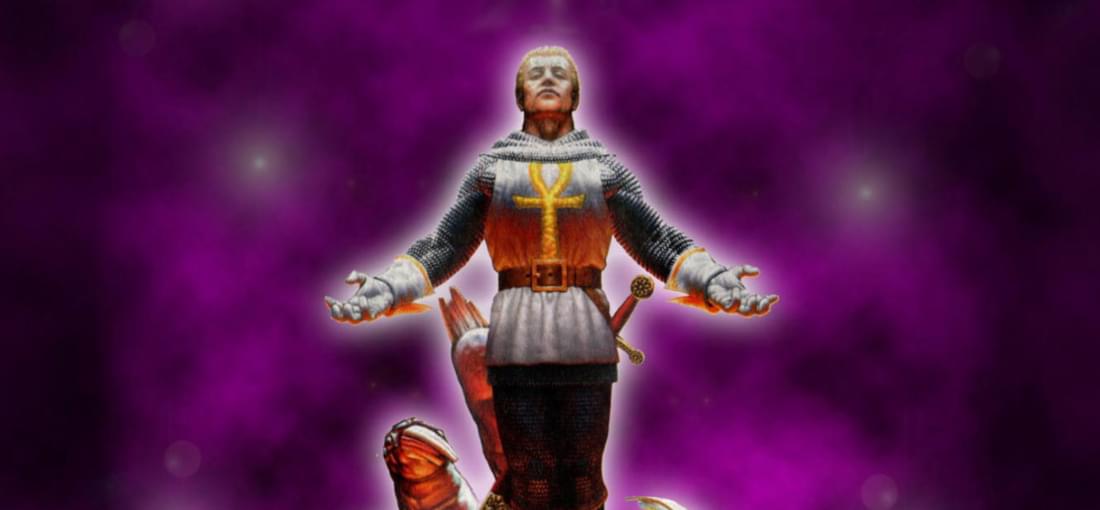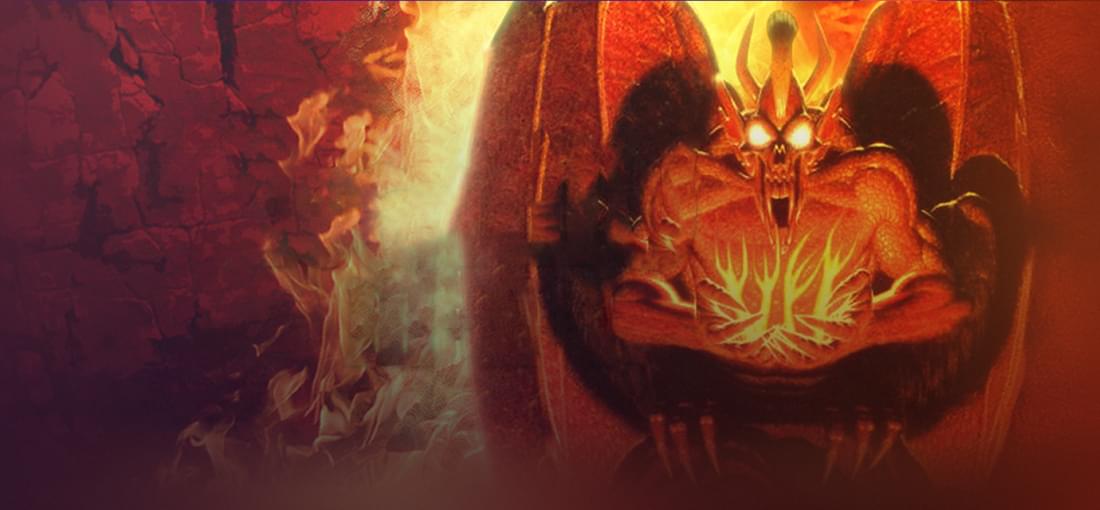


Ultima IX is a tough game to write about. As the final chapter of one of the greatest RPG sagas of all time, Ultima IX is undoubtedly disappointing, filled with retcons and devoid of what made previous Ultimas great. Towns are absurdly small (Brittania consists of Lord British's castle and like three small buildings; this is par for the course in this game), the world is not very big or conducive to exploration, the plot is meh, it's filled with series retcons, and calling it an RPG is a HUGE stretch. Ultima IX lacks what made previous games special and is undoubtedly disappointing. However, at the same time, I think Ultima IX is an entertaining and pretty alright game divorced from the rest of the series. The combat is pretty shallow but is certainly fun, going through dungeons is pretty damned entertaining, the jumping is probably the best I've ever seen in a video game, it looked great for its time, and it can be really fun to mess around and, while the voice acting is pretty terrible, it can be good for a laugh. They did a great job with the art design and it's fun to see what they did with certain areas of the world. So, Ultima IX is actually not a bad game. While I wish it could have been another Ultima VII, a beautiful, deep RPG that would have sent the series out on high note, and while I resent the retcons this game makes, I can't help but enjoy it. As an Ultima game, it's a disappointment. As a game in general, it's not half bad.

A few years back, I decided, after having wanted to get into Ultima for years, that I would sit down and play through both parts of Ultima VII. For about two months, the game basically took over my life; I ate, slept, and breathed Ultima VII. It was the only thing I talked about. Indeed, it is easy to see why: Ultima VII is one of the best and biggest RPGs of all time. The world is massive (as RPS put it, if the game were made today, it would require enough gigabytes to crush Ireland), and the game is incredibly ambitious. Ultima VII creates an absolutely massive world with wonderful characters and fantastic lore. While the overall plot isn't necessarily anything special, all the small stories you experience along the way are brilliant. Serpent Isle is even better, with a larger, more mysterious world to explore and an improved story, and is definitely the pinnacle of the Ultima series. It is massive, intriguing, and filled with emotional moments. The only issue I can think of is that the combat can sometimes be flat and uninteresting, but there's so much else to the game that this issue is minor. Ultima VII is truly one of the greatest games of all time, and probably the greatest CRPG ever made. It is most definitely the pinnacle of the Ultima franchise (the series, unfortunately, went downhill after VII with the alright VIII and simply average IX), and any fan of RPGs owes it to themselves to have this game in their catalog. At only $5.99, this game is a steal, considering how massive it is and the fact that you're getting both parts AND the add-ons.

I'm a big fan of Ultima and have been waiting for the release of the main series since the announcement of the GOG's deal with EA. Imagine, then, my excitement when GOG released the first three games in the Ultima series. The first game in the series, Ultima I: The First Age of Darkness, is a fantastic game. Graphics aren't an issue, as this package includes the VGA update, and as such, the game manages to look relatively good. Gameplay consists of traveling the world, exploring dungeons and performing quests for various monarchs throughout the land of Sosaria. It's basic, but it manages to stay fun throughout, while throwing in a few surprises (a space segment comes to mind). The gameplay is basic, but that doesn't particularly shine through, and I hardly noticed while playing. I cannot say the same, unfortunately, about Ultima II. By today's standards, the graphics in Ultima II are downright archaic; only 4 colors are used, which eventually tends to grate on the eyes. This is not a fatal weakness and the game is still playable; however, many may want to download the graphical update patch developed by fans. Ultima II is certainly a step down from the first game. The game makes little sense (I still don't know why it takes place on Earth and why Lord British is hiding out in 1990s England), the world feels smaller than that of Ultima I, and there is far less variety. In fact, the questing system of the original is all but eliminated from Ultima II. Instead, the player travels through different time periods of Earth's history in an attempt to track down certain items and level up your character, as well as acquire new equipment. The items necessary to defeat Minax are not adequately hinted at in the game or the manual, meaning goals are often cryptic. I often found myself wandering with no idea what to do. In addition, EVERYTHING in this game requires gold, whether it be HP, attribute increases, items necessary for winning the game, or equipment. As such, one needs a lot of gold; acquiring gold involves killing ridiculous amounts of monsters. There is little gold and few monsters in dungeons, removing the incentive to enter them. Killing monsters generally yields anywhere from 1 to 17 gold (it is completely random), and acquiring gold literally takes up about 90% of the game. Acquiring the necessary amount of gold requires hours of ceaseless grinding. In fact, Ultima II is essentially a non-stop grindfest of frustrating proportions, and while Ultima I overcomes its basic gameplay to provide a fun experience, the EXTREMELY repetitive nature of Ultima II highlights it. Ultima III on the other hand, sees Ultima maturing towards the form it would take with Ultima IV. Generally considered to be the first true CRPG, Ultima III no longer sees you traveling alone; you can form a party of up to 4 characters to take with you on adventures. While the graphics still grate on teh eyes, the game looks considerably better than Ultima II. The locale is moved back to Sosaria under the rule of Lord British, providing a nice contrast to the silliness of the locales of Ultima II. Combat is much improved; due to the party system, initiating combat brings up a small map upon which you can maneuver your party members in an attack against the enemy. The system has considerably more depth than that of the previous two games, which consisted of trading blows with enemies. Dungeons look nicer and feel like dungeons, with solid walls rather than simple outlines. There are a few issues with the game (why is it so difficult to acquire torches, for example) but overall, Ultima III is a huge step forward for the series and the RPG genre as a whole, and would pave the way for future games. So, while Ultima I-III are dated games, this package is certainly worth your time (although feel free to give II a miss). The package provides a good picture of the early days of CRPGs, and the evolution of the series as a whole mirrors the evolution of the RPG. For some, it will be best to start at VI or VII (which are far less dated and far superior games, especially VII, which is one of the greatest games of all time), but to those who want to experience a piece of history, and to those who can handle some dated graphics and gameplay, pick these games up.

After reading all the great reviews on GOG and noticing it was on the GOG Starter Mix, I decided to purchase this game and give it a try. After reading the description, I was expecting something fantastic. To be honest, I found Sanitarium to be a somewhat mediocre game. It's not bad by any means; but it's not particularly good, either. Essentially, the protagonist awakes in an asylum and seems to have all these insane, crazy journeys, presumably in his mind, that have little to do with the main plot besides a symbolic connection. The puzzles weren't particularly interesting, the controls were clunky, and, while I found the individual adventures to be somewhat entertaining, the main plot didn't come together well and the plot twist at the end was a bit of a disappointment. I can see how some people would love this game; it has a fantastically creepy atmosphere and it IS undeniably interesting. I enjoy adventure games, and I enjoy stories involving insanity and psychology, but to be honest, this one just wasn't my cup of tea. I often found myself somewhat bored, and parts of the game, particularly the second chapter, are somewhat disturbing. Overall, Sanitarium is a decent game, but if you want a good adventure game (or even a good psychological thriller), you could do much better. The promise of exploring a man's insanity is enticing; it's too bad that Sanitarium does not come through.